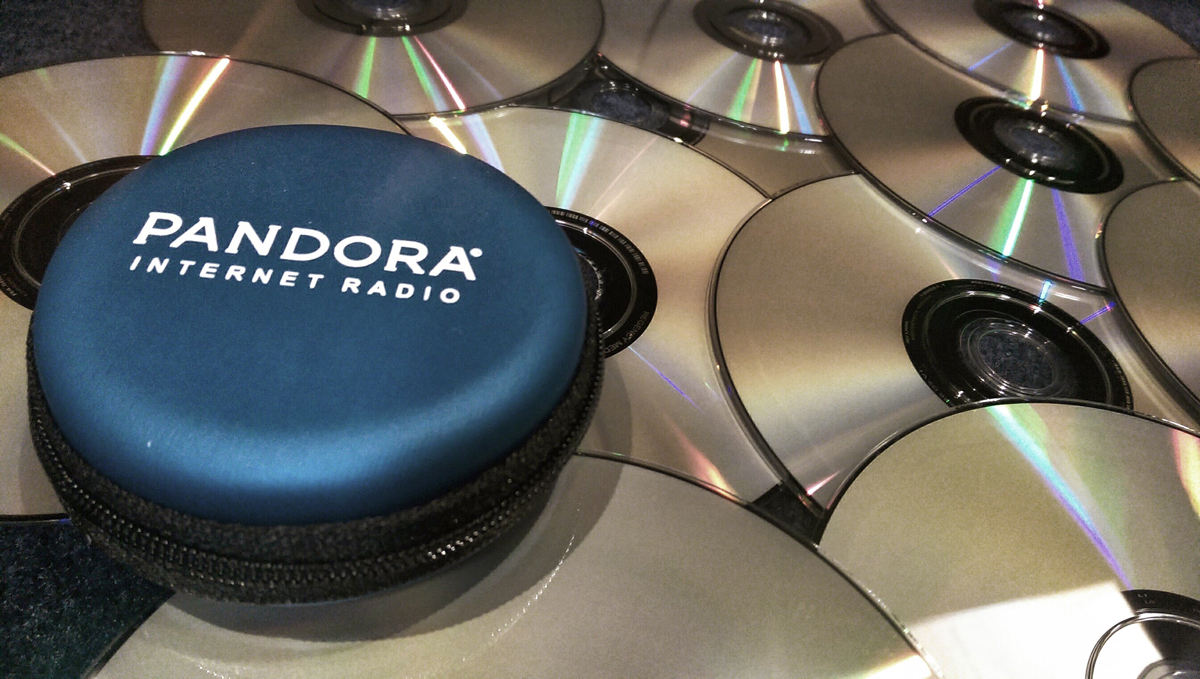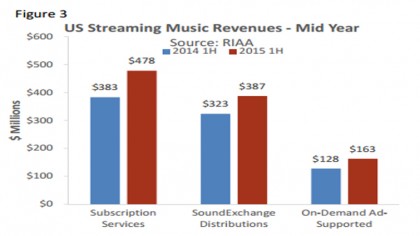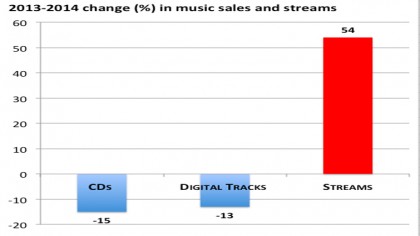Spotify and co. have officially overtaken the old music scene

Sign up for breaking news, reviews, opinion, top tech deals, and more.
You are now subscribed
Your newsletter sign-up was successful
There are five words in the English language that, when used in succession, have the ability to both enrage and belittle music fans: "Your favorite format is dead."
It was said when vinyl gave way to cassette tapes back in the '60s and then again when CDs came around in the '80s. Friends said it to one another when CDs were overtaken by MP3s in the late '90s and now, here in 2015, it will come back into the public vernacular as streaming music services have become the world's preferred way to listen to music.
For the first time ever, streaming revenue has surpassed $1 billion dollars.
And while the disappearance of physical media is interesting in its own right, the more interesting point here, my fellow music enthusiasts, is this explosive growth in streaming and simultaneous shrinking in every other sector means that we have front-row seats to the death knell of ownership.
Where is this all coming from? The Recording Industry Association of America (RIAA). According to new data by the RIAA, streaming music has finally surpassed physical media (i.e. CDs and vinyl) in sales, and, if streaming music continues on this path, it will overtake digital distribution by the end of next year.

So, I hate to be the bearer of bad news, but there's a clear message here for CD lovers and anyone who actually paid for their digital music library: Your favorite format may not be dead, but it is dying.
It wasn't all that long ago that digital music sales conquered physical media, thanks in no small part to Apple and Google's steadily growing storefronts. Together they, alongside various other e-tailers like Amazon, sold around $6.85 billion in digital content last year.
Sign up for breaking news, reviews, opinion, top tech deals, and more.
This year, many of those same companies are pushing Spotify-esque streaming services to the forefront of their digital businesses. Apple Music and Google Play Music are already huge forces in the streaming space, despite the former's recent arrival on the scene, while darkhorse Amazon Prime Music is quickly catching up thanks to its integration on the Amazon Fire TV, Amazon Fire TV Stick and Amazon Echo.
So while we guffawed when Taylor Swift withdrew her music from Spotify to support Apple Music, there were severe financial implications that almost certainly didn't have Spotify laughing. (Different sources speculate varying amounts, but Swift's music was on over 19 million playlists on Spotify and brought in $500,000 to $2 million in revenue in 2014.)
But why shouldn't streaming services eventually win out? The same thing is happening to films thanks to iTunes, Amazon and Netflix. DVD player sales started to dip in 2006, while the number of streaming-enabled devices has grown exponentially.
Music and movie services like Apple Music, Spotify and Netflix represent a growing movement that's shifting away from physical ownership - or, more precisely, any ownership at all - and more towards simply renting or borrowing on-demand.

I'm not the first to spot this trend, obviously, nor the first to really dive into it. The Atlantic has given it some screen time in its "The Death of Music Sales" feature that ran in January, which made the particularly poignant point that "death" isn't the right word for what's going on.
Dead, in most senses, means nothing or zero. No one in their right mind would call CDs - a format that sold $6.83 billion worth of product in 2014 - dead.
What is happening is that sales are shrinking at a worrying rate as more of us make the switch to streaming services to fulfill our unwavering auditory needs. Of all forms of media, streaming was the only one to see an increase in users in 2015. For better or worse, it looks like more streaming equates to less ownership.
This boils down to one last question: Is ownership worthwhile for you? At the end of the day this is a personal question ... or something to be discussed in the comment section below.
- If you're considering leaving ownership behind, take a look at our best music streaming services roundup.

Nick Pino is Managing Editor, TV and AV for TechRadar's sister site, Tom's Guide. Previously, he was the Senior Editor of Home Entertainment at TechRadar, covering TVs, headphones, speakers, video games, VR and streaming devices. He's also written for GamesRadar+, Official Xbox Magazine, PC Gamer and other outlets over the last decade, and he has a degree in computer science he's not using if anyone wants it.